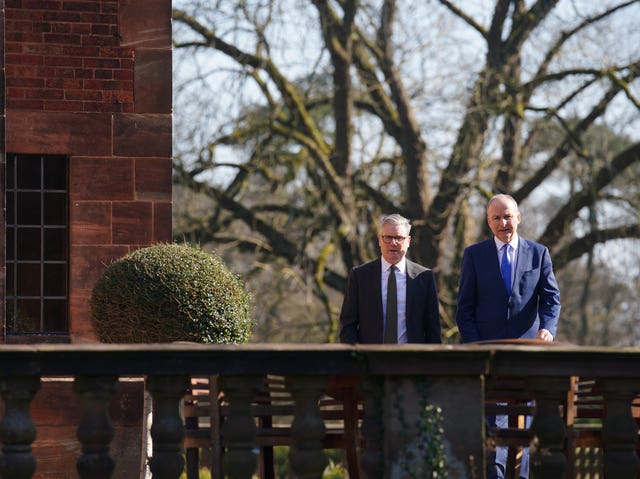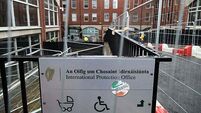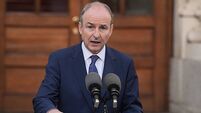Legacy accord offers chance to deal with ‘unfinished business’ of peace process

By Jonathan McCambridge and David Young, PA
A new UK and Irish deal on mechanisms to deal with the Northern Ireland Troubles offers an opportunity to deal with the “unfinished business” of the region’s peace agreement, Hilary Benn said.
The Northern Ireland Secretary was joined by Tánaiste Simon Harris at Hillsborough Castle on Friday afternoon to formally unveil the framework, which has been developed following substantive engagement between the two governments following years of impasse over the toxic legacy of the conflict.
“Dealing with the legacy of the troubles is hard, and that is why it has been for so long the unfinished business of the Good Friday Agreement,” said Mr Benn.
He said: “We have now both an opportunity and a responsibility to try and deal with this and not put off difficult decisions for yet another generation.”
Mr Benn reflected on the impact of hearing stories of loss from victims of the Troubles as he expressed hope that a route to closure was “within our grasp”.
“Given the wide range of views held by victims and survivors’ groups, individuals, families, veterans and political parties in Northern Ireland, it is clear that a perfect outcome is not attainable,” he said.
“But we firmly believe that this agreement, underpinned by new commitments from our two Governments, represents the right approach and history teaches us that peace and reconciliation in Northern Ireland make most progress when our two Governments work together.”
I hope that victims and families see in this deal a set of substantive commitments, that leave behind the flawed Legacy Act, and that are genuinely designed to provide answers for victims, survivors and families
Mr Harris described the framework as a “night and day improvement” on the previous mechanisms introduced unilaterally by the last UK government.
The new framework, which includes commitments to fundamentally reform the mechanisms established in the 2023 Legacy Act, has raised expectations that the Government is moving closer to dropping its interstate legal case against the UK.
Mr Harris said his Government would “revisit” its stance on the legal action if the legislative commitments laid out in the framework are faithfully implemented.
Labour came to power with a pledge to replace and repeal the 2023 Legacy Act introduced by the Conservatives, which halted scores of civil cases and inquests into Troubles deaths.
The Act was opposed by victims’ groups and political parties in Northern Ireland, and it led the Dublin Government to launch an interstate legal case against the UK, claiming it breached the European Convention on Human Rights (ECHR).
The legislation created a new legacy body, the Independent Commission for Reconciliation and Information Recovery (ICRIR), to take over the investigation of all outstanding Troubles cases.
The Act also contained an offer of conditional immunity to some suspects, but this was disapplied after legal action by bereaved families.
The new framework is closer to the details of the Stormont House Agreement of 2014, which were never implemented.
It will see the ICRIR fundamentally reformed to become a Legacy Commission, which will investigate Troubles deaths.
A separate body will be created to deal with information recovery.

The framework includes the following measures:
– Removal of the bar on legacy-related civil cases in UK courts and allow the resumption of inquests that were halted by the Legacy Act. Inquests that had not been started before the Legacy Act’s legal guillotine came into force will be reviewed to establish the best way forward.
– Significant restructuring of the ICRIR. It will be renamed the Legacy Commission. There will be two co-equal directors of investigations. A statutory independent oversight board will be created, along with an advisory group made up of victims and survivors. An independent panel will also advise on senior appointments to the commission. Measures will be introduced to identify any conflict of interest issues within the commission.
– The commission will be empowered to carry out investigations capable of leading to prosecutions.
– Independent judges will hold inquisitorial public hearings, with victims’ families able to participate.
– A separate truth recovery mechanism will be created called the Independent Commission on Information Retrieval. This will be a jointly funded UK/Irish cross-border body that will initially operate on a pilot basis.
– Reform of disclosure processes to address concerns over a controversial veto power held by the Northern Ireland Secretary of State on what sensitive information can be accessed by legacy bodies.
– The Government will commit to “fullest possible cooperate” with the new Legacy Commission.
– A new dedicated Legacy Unit will be created within An Garda Síochána.
– The Government will also ring-fence €25 million to support victims and survivors in participating and engaging with legacy bodies.
The two governments believe the new framework includes proposals which are ECHR-compliant and are capable of securing the support of victims and bereaved families.
Mr Harris said the joint agreement had created a moment of “imperfect opportunity”.
“It would be easy to hold out for the perfect, to inevitably fail, and then to stand criticising on the sidelines; a comfortable hurler on the ditch,” he said.
“That would be a fundamental mistake; one that could not later be rectified.”
Mr Harris urge victims and survivors to consider supporting the proposals.
“I hope that victims and families see in this deal a set of substantive commitments, that leave behind the flawed Legacy Act, and that are genuinely designed to provide answers for victims, survivors and families,” he said.
The framework will require new legislation at both Westminster and at the Dáil.
Both governments have carried out consultations with victims’ groups and families and will continue to do so once the framework is published.
The UK Government has also published separate measures aimed at offering protections to witnesses participating in Troubles-related probes.
The measures have been designed with veterans in mind, such as the ability for them to participate or give evidence remotely from Great Britain, without having to travel back to Northern Ireland.





